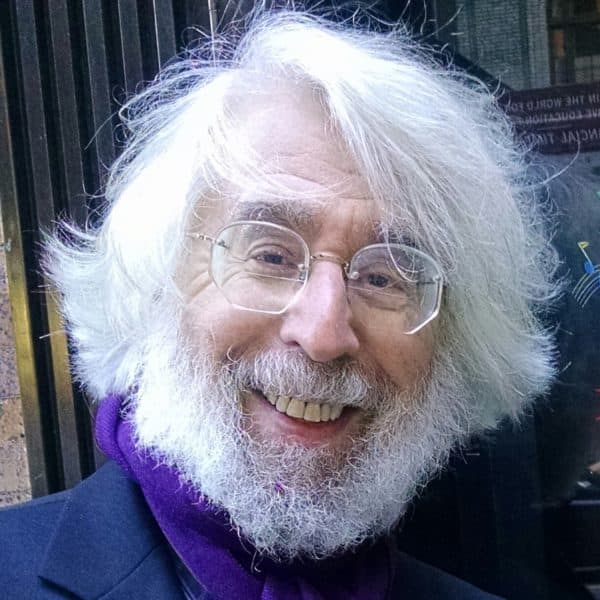Advertisement
The Year In Arts & Culture
The Best Poetry Boston Gave Us In 2019
The poetry world in and around Boston is one of the richest in the country — so many good writers, so much variety and depth. Between the Grolier Poetry Book Shop and the Blacksmith House Poetry Series and Harvard, perhaps the real center of poetry life is in Cambridge; but not only Boston, but Brookline, Arlington and Somerville might be ready to dispute that opinion (one of Somerville’s state reps is not only a published poet but a good and serious one).
Disputes aside, here are some of the poetry books, and some of the poems from them, by local writers that have impressed me this year.
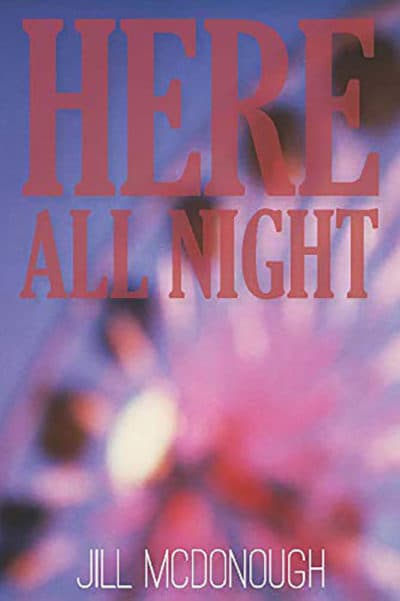
'Here All Night'
By Jill McDonough
Let’s start with Jill McDonough’s “Here All Night” (published by Alice James Books, a press that started in Cambridge but is now housed in Farmington, Maine). McDonough is one of our most irreverent yet whole-hearted, full-hearted poets. As poet Gail Mazur writes on the back cover, “When you pick up a new book of poems that can make you laugh — snort, really — and weep on any page, you know you’ve struck gold.” Here’s one of my favorite poems from this collection, a poem that looks back to McDonough’s experience teaching in prisons.
'Cindy Comes to Hear Me Read'
Cindy: not her real name. I met her
in prison, and people in prison I give
the fake names. I taught her Shakespeare, remember
her frown, wide eyes, terror of getting
things wrong. Her clear, arguable thesis
on Desdemona’s motives, Desdemona’s past. The last
days were hard on her, it taking visible work
to see things could be worse. Imagine: I did.
But now she’s out! In jewelry and makeup, new
clothes, haircut she chose and paid for. We hugged.
We’d never hugged; it’s not allowed. On the outside
you can hug whoever you want. She told me she has
an apartment now, a window, an ocean view. She has
a car, she told me, and we both cracked up. The thought of it
wild, as far-fetched then as when you’re a kid playing
grownup, playing any kind of house. She has
a job. She drives there in traffic. Each day
she sees the angry people. Sweet, silly people,
mad — god bless them — at traffic. At other cars.
She laughs, she told me, laughs out loud alone
in her car. People around her angry as toddlers. Whole
highways of traffic, everybody at the work of being free.
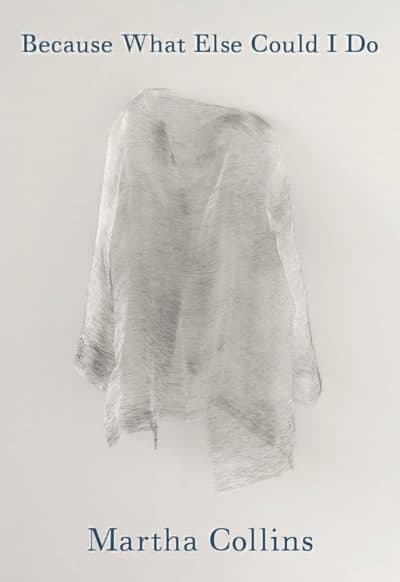
'Because What Else Could I Do'
By Martha Collins
The new book by Martha Collins, “Because What Else Could I Do” (University of Pittsburgh Press), is one of the year’s saddest. This translucent, heartbreaking series of untitled poems is the story of her late husband, universally admired as a kind, gentle, and thoughtful man, a person of complete dependability and consistent good sense … until suddenly he wasn’t. These poems, which Collins addresses directly to her late husband, are urgent and moving fragments of memory, a contemplation of his death and its aftermath.
In the dream we’ve disagreed: you’ve ordered twice
as much fish as we need and when I’ve complainedyou’ve walked out of the store and left the fish and I’ve
walked out behind you and into the night in the littlebeige heels I wore in the picture I sent before
we met and you’ve gone to the car but I haven’tfollowed I’m walking home and home is miles
away in this town which isn’t your town or mineand now it is dark and there are no cars no lights
and I am very afraid: I think I should not be walkingalone and not in these shoes but I am alone and home
is twice as far from here as I ever thought it would be
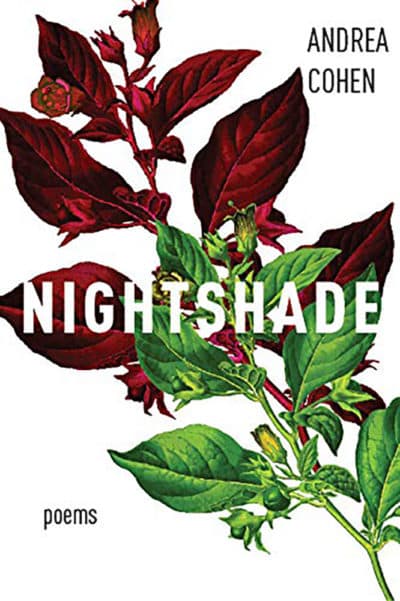
'Nightshade'
By Andrea Cohen
Andrea Cohen is the director of the Blacksmith House Poetry Series, one of our crucial poetry institutions, and an increasingly significant poet in her own right. This year, she released her sixth collection, "Nightshade." And while her cryptic epigrammatic poems are often over in a blink, they stay with you.
'Prayer'
Dear God, give
me the strength —in the presence
of the deaf gods —to stop praying.
Poetry From Arrowsmith Press
Askold Melnyczuk is one of poetry’s heroes. A powerful fiction writer, often dealing with Ukrainian families, he also loves poems. He was the founding editor of Agni, one of this country’s best literary journals, and he’s the publisher of Arrowsmith Press. This year alone, Arrowsmith has released eight poetry collections, appearing at opposite ends of the year in sets of four.
All of these books are by or edited by local residents or former residents, and no two are in any way alike. They range from established poets like Judy Baumel’s “Passeggiate,” Thomas Sayers Ellis’ “The Corny Toys,” and Martin Edmunds’ “Black Ops,” to “City of Water” by Mitch Manning, an impressive young poet not long out of graduate school, to Ukrainian poet Oksana Lutsyshyna’s “Persephone Blues,” to young Nigerian scholar-at-risk Romeo Oriogun’s charged “Museum of Silence,” to combat veteran and editor of the journal Consequence George Kovach’s “The Light Outside,” to Ben Mazer’s edition of “The Uncollected Delmore Schwartz.” All of these books are worth a serious look.
Advertisement
This is one of my favorite poems from Kovach’s “The Light Outside”:
'Bereavement Fare'
The last flight to the coast’s half full:
a mix of frequent flyers settled, reclined,re-routed travelers who’ve missed connections
uncertain about their baggage, and a handfulof soldiers in sand-colored fatigues, one
across the aisle, younger than my youngest son,still alert, still animated at this late hour.
It’s so clear tonight at thirty thousand feetI can watch the country pass under the right wing
like splotches of amber ganglia, radiant axonsextending then terminating in emptiness. For hours
of intermittent turbulence nothing’s visible. Butdown there millions are sleeping in small rooms,
blinds lowered and shut. Their deep detachment’sa black sink swallowing the land. I’m relieved
to be in the cold, thin air pushing toward a deathI understand and accept, the morning emerging
from the dark horizon, faint purple at the edge.
Others To Note
Here are some this year’s other volumes of poetry — forthright, playful, charming, sexy, elegant, touching — by Boston area writers:
- Lillian-Yvonne Bertram, “How Narrow My Escapes” (New Michigan Press)
- Robert Carr, “The Unbuttoned Eye” (3: A Taos Press)
- Charles Coe, “Memento Mori” (Leapfrog Press)
- Michele Harris, “Blackdamp” (David Robert Books)
- Fanny Howe, “Love and I” (Graywolf Press)
- Porsha Olayiwola, “i shimmer sometimes, too” (Button Press)
- Denise Provost, “Curious Peach” (Ibbetson Street Press)
Bishop and Lowell
This year we got several new books dealing with two towering figures of 20th-century poetry who made their sometime homes in Boston: Robert Lowell and Elizabeth Bishop. Bishop is the subject of a substantial and engrossing new biography, “Love Unknown: The Life and Worlds of Elizabeth Bishop,” by Thomas Travisano (Viking). And poet Saskia Hamilton edited two books centering on the biggest controversy in Lowell’s career: the publication of his Pulitzer Prize-winning sonnet sequence, “The Dolphin,” erotically charged and wrenching poems that trace the stages of his divorce from the celebrated writer Elizabeth Hardwick, his wife of over 20 years, and his involvement with the glamorous Caroline Blackwood, also a writer and heiress to the Guinness fortune, who became his next wife.
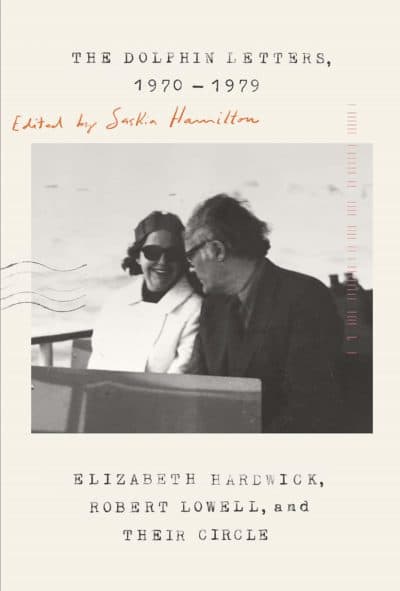
What in particular almost wrecked Lowell’s career was his inclusion of Hardwick’s heartbroken letters about their separation, in poems which both quoted and rewrote her actual letters. Some people, headed by poet and feminist Adrienne Rich (whose career Lowell had strongly supported) were publicly outraged. One of the new books is a new edition of “The Dolphin,” which also includes a photocopy and transcript of Lowell’s typescript of a completely and subtly different earlier version.
The other book, “The Dolphin Letters,” is a nearly-500-page volume of all the surviving letters of the Lowell-Hardwick correspondence as well as letters from people in their circle, including Elizabeth Bishop, whose now famous letter to Lowell warns him that “The Dolphin” — and especially the poems portraying themselves as Hardwick’s poignant letters — would get him into a lot of trouble. She didn’t want him to use Hardwick’s letters at all, but if he insisted on quoting them, he should at least quote them accurately. “Art just isn’t worth that much,” Bishop told him.
These fascinating and riveting books are bound to inspire at least two strongly-felt opinions in the New Year.
